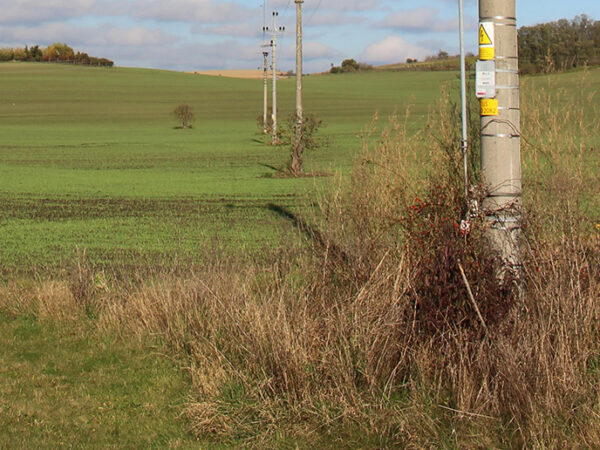If you own a property or are thinking of buying or selling a property, you want to know if there are any easements attached to it. Easements can affect your property value and reduce or restrict your ability to use your own land. It may become more difficult to sell, lease, or otherwise utilize a piece of land or property the way you want if it has an easement.
In addition, you might be inconvenienced or disrupted if the government accesses your land without warning or consent, which the easement allows them to do. Easements can also burden you with certain duties or responsibilities that require you to maintain your land for the use of the easement holder.
How do I find out if there are easements on my property?
There are several ways you can check if there’s an easement on a property you own or are considering buying. However, you should be cautioned that it can sometimes be difficult to determine if there’s an easement on a piece of land with 100% accuracy.
Some of the things you can do to try and find out if there’s an easement on your property include:
- Perform a title search of the property. You’ll generally need the services of a title company or a lawyer to perform a title search.
- Inquire at the county land records office to see if there’s an easement on a prior deed.
- Contact your local utility companies to ask if they have any easements on your property.
- Get a survey of the property from the title company, the courthouse, or the tax assessor’s office.
- Ask the owner or former owners for a warranty deed, a document which could show any easements on the property.
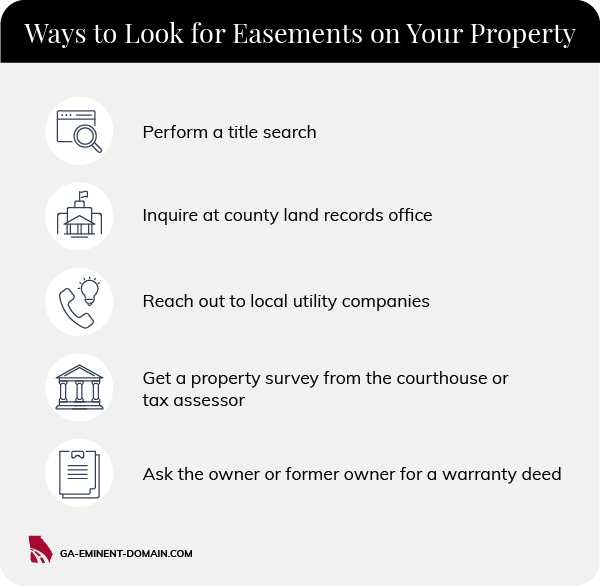
Types of eminent domain property easements and why they may be a problem for property owners
Thanks to eminent domain, the government possesses the power to place a legal easement on otherwise private property so that it may use or access the land for reasons that serve the public good. Easements taken through eminent domain are typically attached to the property’s deed, meaning they remain with the property regardless of who owns it.
The types of easements for which the government or utility company may take your land through eminent domain include:
Utility easements
These allow utility companies access to install and maintain power lines as well as infrastructure to provide electric, water, and gas services. The easement grants them access to use your property however they need to operate and maintain this infrastructure, regardless of how burdensome this may be to you as the property owner.
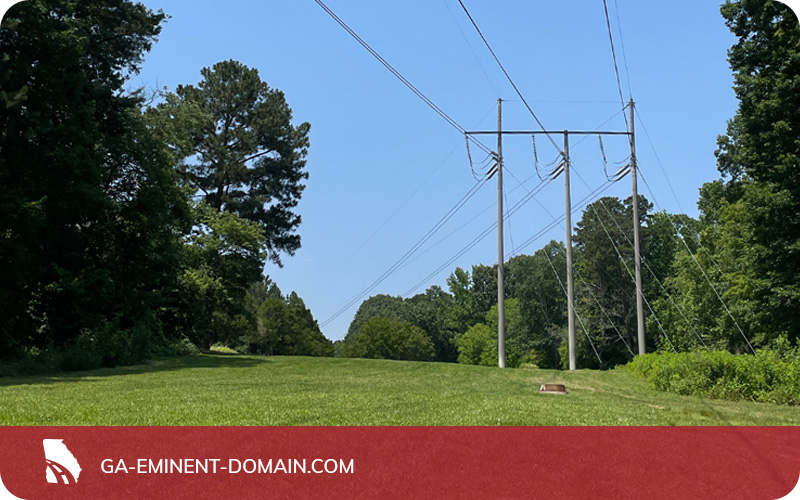
Some of the consequences of having a utility easement on your property might include city crews cutting your trees down to make room for power lines or digging up your garden to access buried pipes.
You might also be required to maintain the easement as if it were your own property, such as by mowing it and preventing debris from accumulating that may hinder its functionality. Failure to do so could result in expensive fines.
Sewer and drainage easements
These utility easements are to prevent flooding and address other water-related problems. They can take many forms such as drains, ditches, retention ponds, and graded surfaces. Like other utility easements, the government can access sewer and drainage easements according to its own schedule, not yours. And you may be required to maintain them yourself to a certain degree.
This can be a problem if an underground pipe breaks in the middle of the night and the city crew starts jackhammering beneath your window at 1 a.m., or you wake up to find that your lawn has washed away entirely. Sewer and drainage easements can also negatively impact property values depending on how disruptive they are.
Temporary construction easements
These allow the government to temporarily take control of a piece of land to support a construction project. These disruptive easements tend to last as long as needed for the sake of the project.
Construction projects can be loud, dirty, dangerous, and inconvenient to have anywhere near you, let alone right up on your property. Even though they’re temporary, construction easements can still create a big hassle, and the resulting project, once complete, could significantly impact your property value.
Other types of easements
There are other types of easements that may exist on your property whether you realize it or not, including:
Prescriptive Easements
This is when someone uses a property they don’t own without permission for a long enough time that they gain the right to use it.
As nefarious as this sounds, it typically applies in situations where someone uses another’s property as a shortcut, such as a group of schoolchildren cutting through a yard to get to the bus stop.
However, these can still become a real problem if left unchecked. A simple example could be if your neighbor built a fence that was three feet onto your property, and you didn’t object. After a certain amount of time, the property they’d fenced off could become theirs through a prescriptive easement.
This situation might impact your property value and could lead to a very awkward relationship with your neighbor, especially if the property gets a new owner who considers the land to be theirs.
Easements appurtenant
This is when two properties are linked together so that the owner of one property benefits from using or accessing the other property.
For example, an easement appurtenant between private property owners might exist if one needs to use the other’s land to access their own, such as with a long driveway running their neighbor’s yard.
These types of relationship-based easements can work well as long as they work for everyone, but what if problems affecting your neighbor’s driveway start to impact your land?
For example, what if your neighbor wants to pave their driveway, necessitating the presence of a paving crew and their equipment on your land? What if you had a respectful relationship with your neighbor with the easement appurtenant, but they sell to someone who litters onto your land from the easement? Depending on the circumstances, your property value might be affected.
Can I block an easement on my property?
In certain extremely rare circumstances, it may be possible to prevent an eminent domain taking of your property for an easement. However, it is very unlikely that you will be successful, and you will almost certainly be better served by trying to increase your compensation from the government instead.
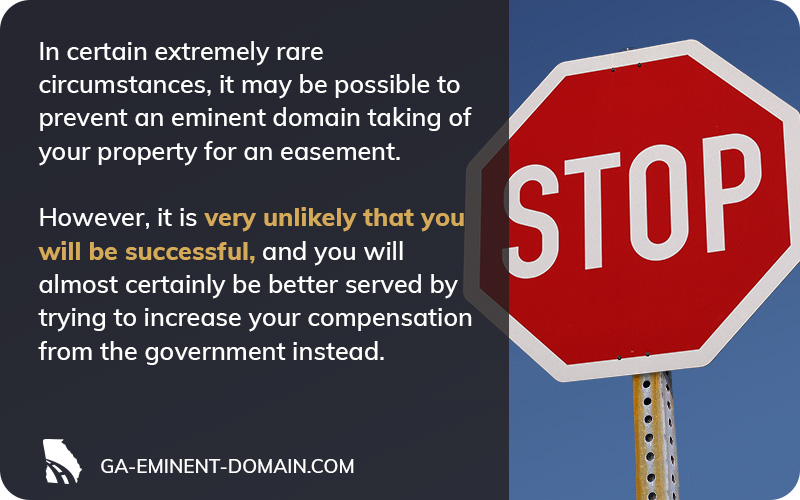
Hire an experienced eminent domain attorney to advise you of your options if you’re facing an unwanted eminent domain taking. Your attorney can increase your chances of maximum compensation!
How an eminent domain lawyer can help
Your eminent domain attorney can:
Offer clarity and guidance
An experienced eminent domain attorney will advise you on your best course of action depending on your unique circumstances. If the DOT is coming for an easement on your land, your lawyer can tell you what type of easement it is, how it may affect you, and what it might mean for your long-term plans for your property.
Help you understand your rights and responsibilities
Finding out you’re getting an easement can be confusing and upsetting. What could be even worse is learning that you’ll also be responsible for maintaining it or to grant access to the easement holder at inconvenient times and with little or no notice.
Our skilled lawyers can help you understand exactly what your obligations are for a looming easement on your property – and your rights.
Fight for just compensation
If the government takes your land through eminent domain to use for an easement, there’s probably little you can do besides trying to ensure that you get the full value for it. An experienced eminent domain attorney will fight for you to receive just compensation for your property.
Our attorneys work on a contingency fee basis.2 That means we advance the costs of hiring any outside professionals who may be needed to build your case, such as appraisers, land surveyors, and civil engineers. They can provide their expert opinion about what your property is really worth, compared to what the government offered.
And if we don’t get you additional compensation above the government’s initial offer, you owe us nothing. Guaranteed.2
And that’s just one of the ways that our firm can help you.
Why hire the Georgia Eminent Domain Law Firm
Our firm is completely devoted to eminent domain law. Several of the attorneys on our team once worked for a state Department of Transportation, handling some of the government’s biggest eminent domain cases. Now, they use that other-side knowledge to benefit property owners whose property is being taken through eminent domain.
On average, our clients get 3x the initial offer for their properties.1
Can I afford an attorney?
With the Georgia Eminent Domain Law Firm, you pay nothing up front, no hourly fee, and no attorney’s fee at all if we don’t increase your initial offer from the government.2
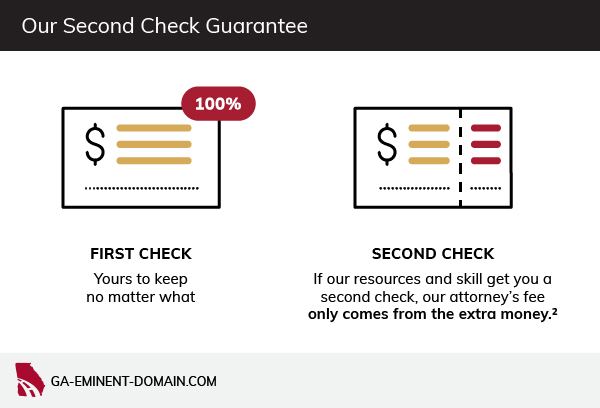
Is the government planning on taking an easement on your land? Call us today for a free case evaluation at 1-888-391-1339 or contact us online.
You May Also Be Interested In
What is a Sewer Easement, and How Does it Affect My Property?
Landlocked Property Law: Can Eminent Domain Take Your Road Access?
7 Examples of Eminent Domain: Key Takeaways for Property Owners Like You

